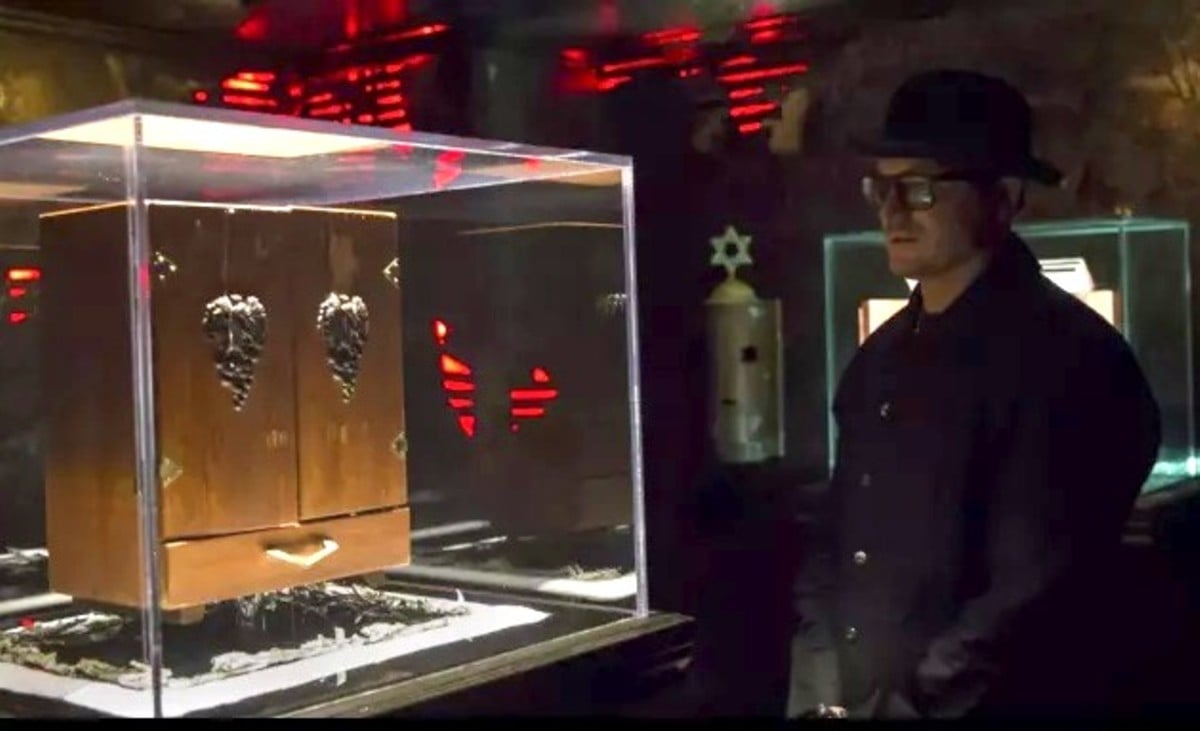[ad_1]
Posted on: November 1, 2024, 08:04h.
Last updated on: October 22, 2024, 10:11h.
EDITOR’S NOTE: “Vegas Myths Busted” publishes new entries every Monday, with a bonus Flashback Friday edition. Today’s entry in our ongoing series originally ran on Feb. 3, 2023.
The centerpiece of Zak Bagans’ The Haunted Museum in downtown Las Vegas is a wine cabinet advertised as “The World’s Most Haunted Object.” Also known as “The Dybbuk Box,” the artifact supposedly has a long history of bringing evil and death upon anyone who disturbs it.

Bagans, the principal host of the Travel Channel series “Ghost Adventures,” claimed to have experienced bad juju as soon as he added the cabinet to his collection of macabre and, frankly, distasteful artifacts in 2017. His museum also contains Ted Bundy’s glasses, a painting made with the cremated ashes of Charles Manson, and a Camaro once owned by David Koresh.
According to the museum’s website, shortly after the cabinet arrived, “mysterious protruding holes began to appear in the walls around the artifact as if something was trying to break out from within the exhibit.”
Bagans was scheduled to open the cursed cabinet himself as the culmination of a live, four-hour Halloween broadcast from the museum in 2018, but he sensed so much evil inside of it, he claimed, that he lost the nerve.
Wine Cabinet of Curiosities
The only problem with the story is that the Dybbuk Box is just an ordinary wine cabinet. In 2021, the man who sold it on eBay 20 years earlier, Kevin Mannis, admitted in an interview that he made up its elaborately detailed paranormal backstory as a social experiment.
I am a creative writer,” he told Charles Moss, a reporter for Inverse, the online science and technology magazine launched in 2015 by Bleacher Report co-founder Dave Nemetz. “The Dybbuk Box is a story that I created. And the Dybbuk Box story has done exactly what I intended it to do when I posted it … which is to become an interactive horror story in real-time.”
The box was reportedly sold for $140 to Losif Nietzke, who was, at the time, a student in Missouri. Nietzke resold it to Jason Haxton, director of the Museum of Osteopathic Medicine at A.T. Still University. Haxton wrote about his allegedly dark experiences with the wine cabinet in a book called “The Dibbuk Box.” Bagans purchased the box from Haxton in 2016 for an undisclosed sum.
Mannis’ elaborately detailed work of fiction even landed him a job as a consultant on “The Possession” since Sam Raimi produced a 2012 horror film based on Mannis’ story.
The eBay Listing
Here’s the story Mannis made up straight from his 2003 eBay listing…
Mannis was a Portland, Ore. furniture restorer when he purchased the Dybbuk Box at a garage sale in 2001. It was sold to him by the granddaughter of a recently deceased 103-year-old Holocaust survivor named Havela, who escaped Nazi-occupied Poland. Havela’s parents, brothers, sister, husband, two sons, and daughter weren’t so lucky.
Havela’s granddaughter told Mannis that her grandmother always kept the wine cabinet shut and out of reach because there was a dybbuk — an evil spirit in Jewish folklore — living inside it. She instructed Mannis never to open it, or bad things would happen.
Mannis ignored the warning, and … bad things happened. (Bet you didn’t see that coming!)
While restoring the wine cabinet as a gift to his mother, Mannis found a series of strange objects inside. There were two US wheat pennies from 1925 and 1928, two locks of hair, a dried rosebud, a candlestick with octopus legs, a golden wine cup, and a granite sculpture inscribed with the Hebrew word shalom. The Shema, a Jewish prayer from the Bible, was carved on the back of the cabinet.
After opening the box, the first bad thing that happened to Mannis was a phone call from a saleswoman at his furniture restoration shop. She screamed that an intruder was in the basement, the location of Mannis’ workshop, breaking glass and swearing. The intruder had also locked the iron security gates and the emergency exit so she couldn’t escape. As Mannis told her to call the police, his battery died.
Mannis rushed back to his shop and unlocked the gates and exits. When he entered his workshop, none of the lights worked, and all the bulbs shattered in their sockets. Shortly after that, the brother of a store employee died by suicide after accidentally knocking the cabinet off its shelf. A couple of years later, that employee also took his own life.
Mother Knows Best
Not a believer yet? Wait until you hear what happened after Mannis finally gave the Dybbuk box to its intended recipient. Once again, this is all according to Mannis’ 2003 eBay listing…
It was Halloween (because, of course, it was). While his mother examined her gift in the store, Mannis left the room for five minutes. When he returned, she was unconscious and unresponsive. She had suffered a stroke. The next day in the hospital, she could communicate only by pointing to letters of the alphabet on a sheet of paper. She spelled out “N-O G-I-F-T.”
On the very same day as his mother’s stroke, the lease to Mannis’ shop was terminated without cause or explanation.
“I would destroy this thing in a second,” Mannis wrote in his eBay listing, “except I really don’t have any understanding of what I may or may not be dealing with. I am afraid (and I do mean afraid) that if I destroy the cabinet, whatever it is that seems to have come with the cabinet may just stay here with me.”
Mannis ended his listing with the tagline: “Help me.”
The Truth
There’s no such thing as a Dybbuk Box – at least, there wasn’t before Mannis made the term up. Now, there are dozens for sale on eBay, Etsy, and dybbukstore.com. (Yes, they have their own online store.)
Jewish folklore defined Dybbuks as evil spirits, but they were alleged to inhabit living beings, never furniture pieces.
Mannis did buy the wine cabinet at a garage sale. But it was sold to him by an attorney, not the granddaughter of a Holocaust survivor. Mannis placed the strange objects inside of it himself. He also carved the Jewish prayer into the back of the cabinet.
Mannis’ mother did suffer a stroke, but she was at home. And she didn’t spell out any ominous gift warnings in the hospital. While the wine cabinet was in Mannis’ possession, this was the only abnormally bad thing that happened to him or anyone close to him.
Oh, and Mannis never had a furniture restoration shop. At the time he purchased the wine cabinet, he worked the perfect job for gathering intimate details from strangers’ lives to use in his creepy stories.
He was a bartender.
Look for “Vegas Myths Busted” every Monday on Casino.org. Visit VegasMythsBusted.com to read previously busted Vegas myths. Got a suggestion for a Vegas myth that needs busting? Email corey@casino.org.
[ad_2]
Source link


